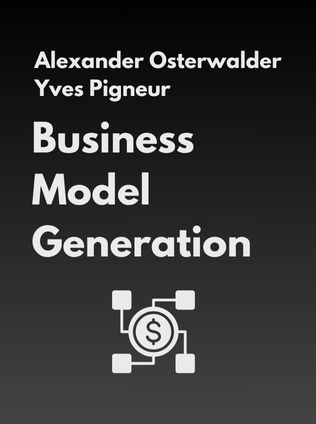
Business Model Generation
By Alexander Osterwalder and Yves Pigneur
Published 08/2010
About the Author
Alexander Osterwalder, a leading innovator in the field of business modeling, has profoundly impacted how businesses conceptualize and develop their strategic frameworks. With a background in political science and a Ph.D. from the University of Lausanne, Osterwalder has devoted his career to exploring the intricacies of business models and how they can be leveraged to drive innovation and growth. His approach is grounded in practicality, making complex business concepts accessible to a broad audience.
Osterwalder's work is best known for its contribution to the development of the Business Model Canvas, a strategic management tool that provides a visual framework for designing, assessing, and reinventing business models. This tool, introduced in his book Business Model Generation, co-authored with Yves Pigneur, has become a cornerstone in the field of business strategy. Yves Pigneur, a professor at the University of Lausanne, has collaborated extensively with Osterwalder, bringing his expertise in information systems to their joint work. Together, they have created a methodology that not only helps established businesses refine their strategies but also aids startups in building robust, scalable business models.
Their work is characterized by a deep understanding of the evolving nature of business environments. They emphasize the need for businesses to continually innovate and adapt their models to stay competitive in an increasingly dynamic marketplace. Osterwalder and Pigneur’s contributions extend beyond the canvas; they have also been influential in promoting the importance of visual thinking in business strategy, arguing that the use of visual tools can significantly enhance the clarity and effectiveness of strategic planning.
Main Idea
Business Model Generation is a comprehensive guide that aims to empower entrepreneurs and business leaders to rethink and redesign their business models in innovative ways. The main idea of the book revolves around the Business Model Canvas, a visual framework that outlines the nine essential elements of any business model. These elements include Customer Segments, Value Propositions, Channels, Customer Relationships, Revenue Streams, Key Resources, Key Activities, Key Partnerships, and Cost Structure.
The authors argue that successful business models are not static; they must be continuously adapted and refined to meet the changing needs of the market and the business environment. By using the Business Model Canvas, businesses can systematically evaluate and innovate their models, ensuring that all elements are aligned and contribute to a coherent, value-driven strategy. The book also presents a variety of business model patterns and strategies that companies can adopt or adapt to enhance their competitive advantage.
The Importance of Innovation in Business Models
At the core of Business Model Generation is the idea that innovation is essential for business survival and success. The authors emphasize that the average lifespan of a successful business model has significantly decreased, necessitating a continuous evaluation and reinvention process. They highlight that businesses must be proactive in identifying and seizing new opportunities, which often requires breaking away from traditional business practices and embracing new approaches.
As the authors state, "A company without a well-defined and adaptable business model is like a ship without a compass—directionless and vulnerable to the whims of external forces." This quote underscores the necessity for businesses to have a clear understanding of their business model and the agility to pivot when necessary.
Sign up for FREE and get access to 1,400+ books summaries.
You May Also Like
Rich Dad Poor Dad
What the Rich Teach Their Kids About Money - That the Poor and Middle Class Do Not!
By Robert T. KiyosakiFreakonomics
A Rogue Economist Explores the Hidden Side of Everything
By Steven D. Levitt and Stephen J. DubnerThe Lean Startup
How Today's Entrepreneurs Use Continuous Innovation to Create Radically Successful Businesses
By Eric RiesWho Moved My Cheese?
An Amazing Way to Deal with Change in Your Work and in Your Life
By Spencer Johnson, M.D.Factfulness
Ten Reasons We're Wrong About the World – and Why Things Are Better Than You Think
By Hans RoslingMake Your Bed
Little Things That Can Change Your Life...And Maybe the World
By William H. McRaven



















